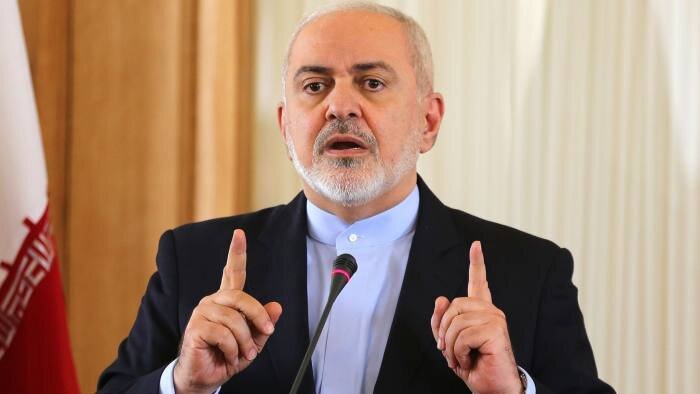Zarif expresses surprise over EU statement on Iran’s nuclear steps

TEHRAN – Foreign Minister Mohammad Javad Zarif late on Monday slammed the European Union’s statement on Iran which is reducing its commitments under the 2015 nuclear deal in response to the return of sanctions by the United States and inaction by the Europeans shield Iran from the sanctions effect.
Under the nuclear pact - formally known as the JCPOA – Iran is tasked to limit its nuclear activities in exchange for termination of economic and financial sanctions.
EU foreign policy chief Federica Mogherini and European parties to the deal - Britain, France and Germany - issued a statement on Monday urging Tehran to comply with the accord or face action which could include sanctions, Reuters reported.
The three countries have claimed Iran has breached the JCPOA, saying Iran should “reverse all measures”.
“We affirm our readiness to consider all mechanisms in the JCPOA, including the dispute resolution mechanism, to resolve the issues related to Iran’s implementation of its JCPOA commitments,” the European states said.
Writing on his Twitter account, Zarif expressed surprise over the content of the statement, saying while Iran remained fully loyal to its nuclear commitments even one year after the U.S. abandoned the deal and returned sanctions and imposed new ones, the European side was just an onlooker and did nothing in line with its obligations.
Zarif tells Europeans: “Just show ONE (example) that you’ve upheld (your commitments) in the last 18 months.”
“To my EU/E3 Colleagues: 1. ‘Fully upheld commitments under JCPOA’ YOU? Really? Just show ONE that you’ve upheld in the last 18 months. 2. Iran triggered-& exhausted-dispute resolution mechanism while you were procrastinating. We’re now using para36 remedies,” Zarif wrote.
Zarif, who crafted the JCPOA along with other top Iranian, European, American, Chinese and Russian negotiators, said Iran is scaling down its nuclear commitments based on the paragraph 36 of the JCPOA which “allows one side, under certain circumstances, to stop complying with the deal if the other side is out of compliance.”
The statement by the European side followed after Iran injected uranium gas into 1,044 centrifuges at the Fordow nuclear site at the presence of inspectors from the International Atomic Energy Agency (IAEA).
The IAEA confirmed on Monday that Iran has begun enriching uranium at the Fordow nuclear plant.
U.S. President Donald Trump abandoned the deal in May 2018 in line with his administration’s “maximum pressure” strategy against Iran. His administration even introduced a total ban on Iran’s oil export earlier this year.
On May 8, exactly one year after the U.S. abandoned the deal, Tehran said its “strategic patience” is over and began to partially reduce its commitments to the agreement at bi-monthly intervals.
In the first stage, Iran announced that it will not limit its stockpile of the nuclear fuel to 300 kilograms allowed under the deal. On that date (May 8) Iran’s Supreme National Security Council (SNSC) said if the remaining parties to the JCPOA, especially Europeans, devise a mechanism to protect Iran from the sanctions’ effect in the two-month deadline it will reverse its decision.
But since European parties missed the deadline, on July 7 Iran announced that it has started enriching uranium to a higher purity than the 3.67%, thereby starting the second step.
Again, as Europe missed the second 60-day deadline, Iran moved to take the third step, removing a ban on nuclear research and development (R&D).
Also again as the Europeans failed to draw up a mechanism to guard Iran’s economic interests in accordance with the JCPOA, President Hassan Rouhani on November 5 ordered the Atomic Energy Organization of Iran (AEOI) to start injecting uranium gas into advanced IR-6 centrifuges at Fordow. It was the fourth step by Iran to reduce nuclear commitments.
Iran has repeatedly announced that if the Europeans guarantee Iran’s oil purchases and financial transactions it will immediately reverse its nuclear measures.
Mahmoud Vaezi, Rouhani’s chief of staff, said on Thursday that scaling down commitments does not mean that Iran is seeking to quit the nuclear deal.
Abbas Araqchi, Zarif’s right-hand man, also told RT that Iran’s nuclear step are intended to protect the JCPOA.
NA/PA
